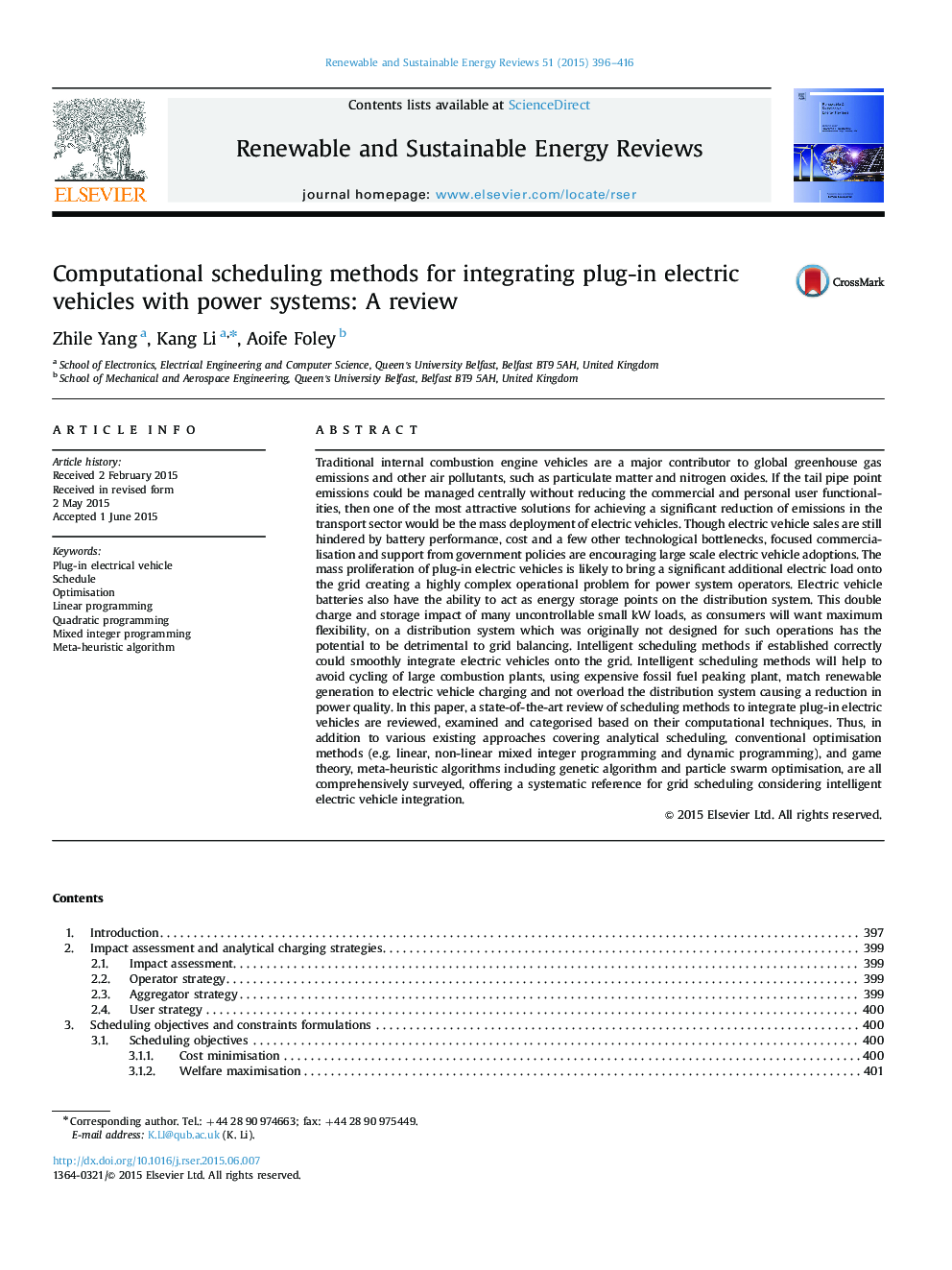| کد مقاله | کد نشریه | سال انتشار | مقاله انگلیسی | نسخه تمام متن |
|---|---|---|---|---|
| 8115714 | 1522334 | 2015 | 21 صفحه PDF | دانلود رایگان |
عنوان انگلیسی مقاله ISI
Computational scheduling methods for integrating plug-in electric vehicles with power systems: A review
ترجمه فارسی عنوان
روش های زمان بندی محاسباتی برای ادغام وسایل الکتریکی پلاگین در سیستم های قدرت: بررسی
دانلود مقاله + سفارش ترجمه
دانلود مقاله ISI انگلیسی
رایگان برای ایرانیان
کلمات کلیدی
وسیله نقلیه الکتریکی پلاگین برنامه، بهینه سازی، برنامه ریزی خطی، برنامه نویسی درجه یک، برنامه ریزی عدد صحیح مختلط، الگوریتم فراشناسی،
ترجمه چکیده
وسایل نقلیه سنتی موتور احتراق داخلی یکی از مهمترین اهداف انتشار جهانی گازهای گلخانه ای و دیگر آلاینده های هوا مانند ذرات جامد و اکسید نیتروژن است. اگر قطر لوله دم لوله می تواند به طور مرکزی بدون کاهش قابلیت های تجاری و شخصی کاربر مدیریت شود، یکی از جذاب ترین راه حل ها برای دستیابی به کاهش قابل توجه انتشار گازهای گلخانه ای در بخش حمل و نقل، توده ای وسیع از وسایل الکتریکی است. اگر چه فروش خودروهای الکتریکی با عملکرد باتری، هزینه و چند تنگنای تکنولوژیکی دیگر، مانع فروش تجاری و حمایت از سیاست های دولتی شده است، اما تشویق وسیله نقلیه وسیع برق را تشویق می کند. انتشار انبوه وسیله نقلیه الکتریکی پلاگین احتمالا یک بار بار الکتریکی قابل توجهی در شبکه ایجاد می کند که یک عامل عملیاتی بسیار پیچیده برای اپراتورهای سیستم برق است. باتری های الکتریکی خودرو نیز توانایی عمل به عنوان نقاط ذخیره انرژی در سیستم توزیع را دارند. این تأثیر دوگانه و ذخیره سازی بسیاری از کنترل های غیرمستقیم بر کیلو وات، به دلیل اینکه مصرف کنندگان خواستار حداکثر انعطاف پذیری در یک سیستم توزیع شده می شوند که در ابتدا برای چنین عملیاتی طراحی نشده است، ممکن است به تعادل شبکه منفی باشد. روش های برنامه ریزی هوشمند اگر به درستی ساخته شوند می توانند وسایل نقلیه الکتریکی را به شبکه وصل کنند. روش های برنامه ریزی هوشمند کمک خواهد کرد که از دوچرخه سواری از کارخانه های احتراق بزرگ جلوگیری شود، با استفاده از گران قیمت سوخت فسیلی گران قیمت، تولید مجدد انرژی الکتریکی به شارژ خودرو الکتریکی و تولید بیش از حد سیستم توزیع باعث کاهش کیفیت برق شود. در این مقاله، بررسی پیشرفته ای از روش های برنامه ریزی برای ادغام خودروهای الکتریکی پلاگین بر اساس تکنیک های محاسباتی مورد بررسی، بررسی و دسته بندی قرار می گیرند. بنابراین، علاوه بر رویکردهای مختلف موجود برای برنامه ریزی تحلیلی، روش های بهینه سازی متعارف (مانند برنامه نویسی خطی و غیر خطی عدد صحیح و برنامه نویسی دینامیکی)، و نظریه بازی، الگوریتم های فراشناختی شامل الگوریتم ژنتیک و بهینه سازی ذرات ذرات، به طور جامع مورد بررسی قرار می گیرند ، ارائه مرجع سیستماتیک برای برنامه ریزی شبکه با توجه به یکپارچه سازی هوشمند خودرو الکتریکی.
موضوعات مرتبط
مهندسی و علوم پایه
مهندسی انرژی
انرژی های تجدید پذیر، توسعه پایدار و محیط زیست
چکیده انگلیسی
Traditional internal combustion engine vehicles are a major contributor to global greenhouse gas emissions and other air pollutants, such as particulate matter and nitrogen oxides. If the tail pipe point emissions could be managed centrally without reducing the commercial and personal user functionalities, then one of the most attractive solutions for achieving a significant reduction of emissions in the transport sector would be the mass deployment of electric vehicles. Though electric vehicle sales are still hindered by battery performance, cost and a few other technological bottlenecks, focused commercialisation and support from government policies are encouraging large scale electric vehicle adoptions. The mass proliferation of plug-in electric vehicles is likely to bring a significant additional electric load onto the grid creating a highly complex operational problem for power system operators. Electric vehicle batteries also have the ability to act as energy storage points on the distribution system. This double charge and storage impact of many uncontrollable small kW loads, as consumers will want maximum flexibility, on a distribution system which was originally not designed for such operations has the potential to be detrimental to grid balancing. Intelligent scheduling methods if established correctly could smoothly integrate electric vehicles onto the grid. Intelligent scheduling methods will help to avoid cycling of large combustion plants, using expensive fossil fuel peaking plant, match renewable generation to electric vehicle charging and not overload the distribution system causing a reduction in power quality. In this paper, a state-of-the-art review of scheduling methods to integrate plug-in electric vehicles are reviewed, examined and categorised based on their computational techniques. Thus, in addition to various existing approaches covering analytical scheduling, conventional optimisation methods (e.g. linear, non-linear mixed integer programming and dynamic programming), and game theory, meta-heuristic algorithms including genetic algorithm and particle swarm optimisation, are all comprehensively surveyed, offering a systematic reference for grid scheduling considering intelligent electric vehicle integration.
ناشر
Database: Elsevier - ScienceDirect (ساینس دایرکت)
Journal: Renewable and Sustainable Energy Reviews - Volume 51, November 2015, Pages 396-416
Journal: Renewable and Sustainable Energy Reviews - Volume 51, November 2015, Pages 396-416
نویسندگان
Zhile Yang, Kang Li, Aoife Foley,
